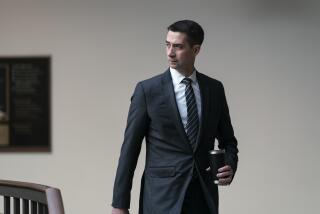Supreme Court looks at race factor in hiring and promotions
WASHINGTON — With Chief Justice John G. Roberts Jr. leading the way, the Supreme Court debated Wednesday whether to put stricter limits on the use of race as a factor in deciding who gets hired or promoted.
The justices heard an appeal brought by white firefighters from New Haven, Conn., who said they were denied promotions because of “racial politics” in the city’s government. They had scored well on a promotional exam, but the test results were thrown out when officials realized it would mean no black firefighters would be promoted.
The case raises a difficult question: Can an employer drop a test that may stand in the way of blacks, or does doing so violate the rights of whites who scored well?
Roberts objected to the city’s claim that it had to give greater weight to the test’s effect on black firefighters.
“Isn’t that kind of a blank check to discriminate” against the white firefighters? he asked. “You don’t care about whether Jones or Smith gets a promotion. All you care about is race.”
A lawyer representing New Haven said the city scrapped the test because officials doubted it was fair.
“There is no entitlement to be promoted based on a flawed test,” Christopher Meade, the city’s lawyer, told the justices. He said that when a promotional standard had an “adverse impact” on minorities, an employer should try again to come up with a better and fairer test.
But Justice Anthony M. Kennedy joined Roberts in voicing skepticism about the city’s action. Officials “looked at the results and classified the successful and unsuccessful applicants by race. I have trouble with that,” he said.
A former law school professor, Kennedy recalled that after giving a test, he would realize sometimes that he could have done something to make the test better or fairer. He added, however, that was not a good reason to cancel the results.
Since becoming chief justice in 2005, Roberts has pressed to end the use of race as a decision-making factor. He led a 5-4 majority that held that school districts could not use voluntary integration plans that assigned some students based on their race. And he criticized as a “sordid business” the part of the Voting Rights Act that requires some electoral districts to be reconfigured based on the race of the voters.
Justices Antonin Scalia, Clarence Thomas and Samuel A. Alito Jr. have agreed with him. If Kennedy joins them in the case heard Wednesday, they could vote to prohibit discrimination against white employees such as the firefighters in New Haven.
Gregory Coleman, a lawyer for the white firefighters, urged the court to say that the racial effects of the test scores could be ignored. Otherwise, “it results in racial balancing and soft quotas,” he said.
Several of the liberal justices came to the city’s defense.
Justice David H. Souter said the city found itself in a “damned-if-you-do, damned-if-you-don’t situation.” If the city had used the test results, black firefighters could sue and say they were excluded because of a discriminatory test. When the city scrapped the results, it was sued by the white firefighters. “Why not give the city an opportunity, in a good faith, to start again?” he said.
Justice Ruth Bader Ginsburg appeared to agree. The white firefighters did not have “any vested right” to a promotion, she said, and the city should be given time to construct a fairer test.
The New Haven case, Ricci vs. DeStefano, will be decided by late June.
--
More to Read
Get the L.A. Times Politics newsletter
Deeply reported insights into legislation, politics and policy from Sacramento, Washington and beyond. In your inbox three times per week.
You may occasionally receive promotional content from the Los Angeles Times.











